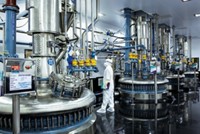Advertisement
Grab your lab coat. Let's get started
Welcome!
Welcome!
Create an account below to get 6 C&EN articles per month, receive newsletters and more - all free.
It seems this is your first time logging in online. Please enter the following information to continue.
As an ACS member you automatically get access to this site. All we need is few more details to create your reading experience.
Not you? Sign in with a different account.
Not you? Sign in with a different account.
ERROR 1
ERROR 1
ERROR 2
ERROR 2
ERROR 2
ERROR 2
ERROR 2
Password and Confirm password must match.
If you have an ACS member number, please enter it here so we can link this account to your membership. (optional)
ERROR 2
ACS values your privacy. By submitting your information, you are gaining access to C&EN and subscribing to our weekly newsletter. We use the information you provide to make your reading experience better, and we will never sell your data to third party members.
Pharmaceuticals
Bulk drug processes
April 9, 2007
| A version of this story appeared in
Volume 85, Issue 15
"BREAKING DOWN BARRIERS," which claims the pharmaceutical industry's manufacturing operations are inefficient, misrepresents the basic problem and lends credibility to unlikely solutions (C&EN, Jan. 22, page 11). We write not to defend the prevailing situation but to recommend a proven remedy that has been around for more than 50 years.
Our own combined experience of 72 years as bulk drug process technologists working in development and first manufacture in a research-based drug firm included participating in most of 30 continuous processes and operations developed for new drugs: continuous stirred-tank reactor cascades, catalytic gas/solid and gas/liquid/solid packed bed reactors, tubular reactors, fluidized bed crystallizers, centrifugal contactors for reaction and purification, impingement jet crystallization, reactive distillation columns, and the like. Of these, 28 made it to the manufacturing plant and product introduction.
On the basis of this experience, we challenge the assertions and most of the quoted opinions about the total prevalence of an inefficient "batch culture" and question the novelty or the broad utility of the silver bullets being promoted for the rescue of bulk drug processing. As Ian Shott says (in one of the few sound quotes in the review), most of what is being promoted "isn't new." Instead, it is mostly repackaging proven goods (for example, well-engineered processes, whether continuous or not) and some new tools of narrow utility (for example, microreactors). Alas, it seems there are customers seeking their manufacturing salvation by scaling down and using "toolbox" methods with new names but with the old substance they should have known and practiced all along.
By far, the worst in the batch processing of bulk drugs arises from insufficient engineering content during conception and development of the processes. Insufficient engineering closes the door on the not-so-rare opportunities for advantageous or compelling application of continuous processing. Indeed, the scale and the uncertainties about product introduction, growth, and profitable exclusivity make the premeditated and well-engineered multiproduct environment optimal for bulk drugs. This choice by no means precludes the insertion of continuous or novel processing methods when they make sense.
Next is the notion that the problem is the culture, fostering medicinal chemistry procedures that pretty much sail into hurried and inefficient manufacturing processes because of "barriers" or haste. What about the large process chemistry establishments in big pharma? We wonder, because we worked intimately with process chemists and in an R&D organization that saw that collaboration as a prime asset in bringing about new drugs. Instead, we submit that if barriers exist, let the tolerant R&D managements be accountable.
Some may dream of making bulk drugs by scaling down, without stirred tanks, centrifuges, and driers. But until such magic is delivered by the consortia or the Food & Drug Administration, they should learn the discipline of doing process development and process engineering "as it should be done," to again quote Shott, and practice it in earnest. Embrace, by all means and with its risks, all that is new and plausibly advantageous, but do so soundly, rediscovering, if necessary, what has consistently delivered good bulk drug processes and plants to more than one pharma organization.
Edward L. Paul
Sea Girt, N.J.
Carlos B. Rosas
New York City



Join the conversation
Contact the reporter
Submit a Letter to the Editor for publication
Engage with us on Twitter